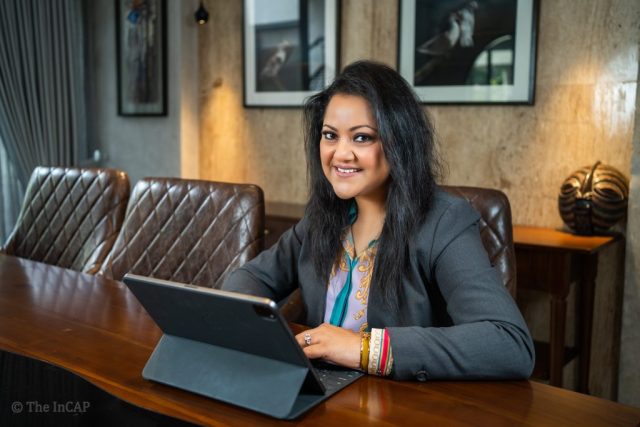Shwapna Bhowmick
Head of Country
Marks & Spencer
Outstanding leadership comes with great responsibilities. Being in an administrative role pushes a person to the center stage, making effective decisions and leading with integrity. Although leadership may be innate in some for all true leaders, it is a skill that requires lifelong nurturing and honing. Unfortunately, in Bangladesh, people are missing an opportunity by failing to capitalize on a valuable resource that could super-charge the RMG industry into a bold new era.
What resource? Female leaders! Looking through an optimistic lens, it is evident that the entire industry requires more female leadership, which will create a diversified environment and enable the industry to tap its maximum potential, especially for an industry where almost 55 percent of nearly 4 million workers are women.
While you are nodding in agreement that we need women leadership in the RMG sector, let us introduce a change-maker, Shwapna Bhowmick, Country Head of Marks & Spencer, who is demonstrating what female leadership in RMG sector looks like. Ms. Shwapna has not only focused on changing the organization, but her primary focus has also been on how women can challenge and change the general perspectives about their leadership capabilities. Of all the reasons behind her entering the garment industry, she desired to contribute to women’s wellbeing as there were hardly any women executives or managers working when she entered the industry.
Shwapna Bhowmick believes that eligible leaders can change a team with efforts that come from self-motivation, with the vision to become a leader who is changing orthodox dogma of the industry, readjusting the focus of the organization, and trying to put the nation’s name in global focus.
Ms. Shwapna kicked off her career at Araf Apparels, and later, she started working in the British multinational clothing brand Next. After that, her career led her to join Walmart, and eventually, she was appointed at Marks & Spencer in 2006 as a Merchandiser. Later she did a two-year stint as the Country Manager for Myanmar M&S Operations in addition to her existing responsibilities. Shwapna is currently serving as the first Bangladeshi. Country Head of Marks & Spencer. Her leadership and commitment have put her in the limelight in Bangladesh and globally.
We are exploring her extraordinary journey through an exclusive interview where she shares her experiences and aspirations, her challenges, and triumphs with us.
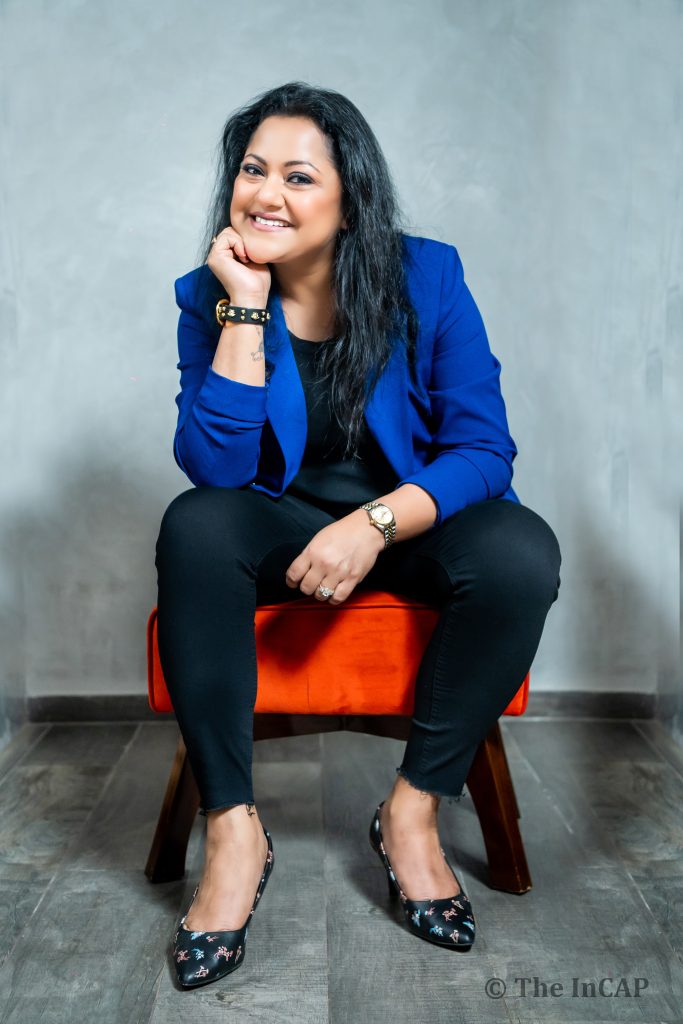
Cogitation of Work
The InCAP: Ms. Shwapna Bhowmick, in an event, you have said that meaningful change has been your only goal since childhood, and that’s what you want to focus on. What’s your vision for it?
Shwapna Bhowmick: When we were young kids, little did we know what we would do in life or from where we should start. Growing up in a residential colony, as my father was a government service holder, there was a community where everybody was aware of their neighbors. Being a kid, we were no exception.
Let your imagination flow with the scenario where, as a young girl, we used to teach kids in the colony apart from playing. It didn’t happen by chance; instead, locality’s needs drove us. Unlike other kids, I was curious about the other side of the colony wall, where it was inhabited by underprivileged people and the locality was poor. Since my father knew me very well, he asked my mother to stop me from going beyond the wall. So, being a naive kid and with a curious mind, I sneaked over to the other side of the wall. The sad condition of the people there shocked me. So much so that it , led me to steal two of my mother’s sarees and give them to a woman living there.
As I was concerned about the outcome, an idea came into my mind that if she made a blanket out of that sarees with the names of my siblings on it, I would be able to sell it to my mother through emotional appeal. I managed to sell it to my mother and gave the proceeds of, as far as I recall, 200 Tk. to that lady. From this incident, many from the colony were eager to get blankets and clothes made by those underprivileged people, especially the women, which created an opportunity for them to earn a living for their families. Gradually, it became a practice and created a tailoring group. I would refer to this as one of the incidents that defined my motivation for bringing change for the better and being self-reliant. I have failed numerous times before bagging achievements in my life.
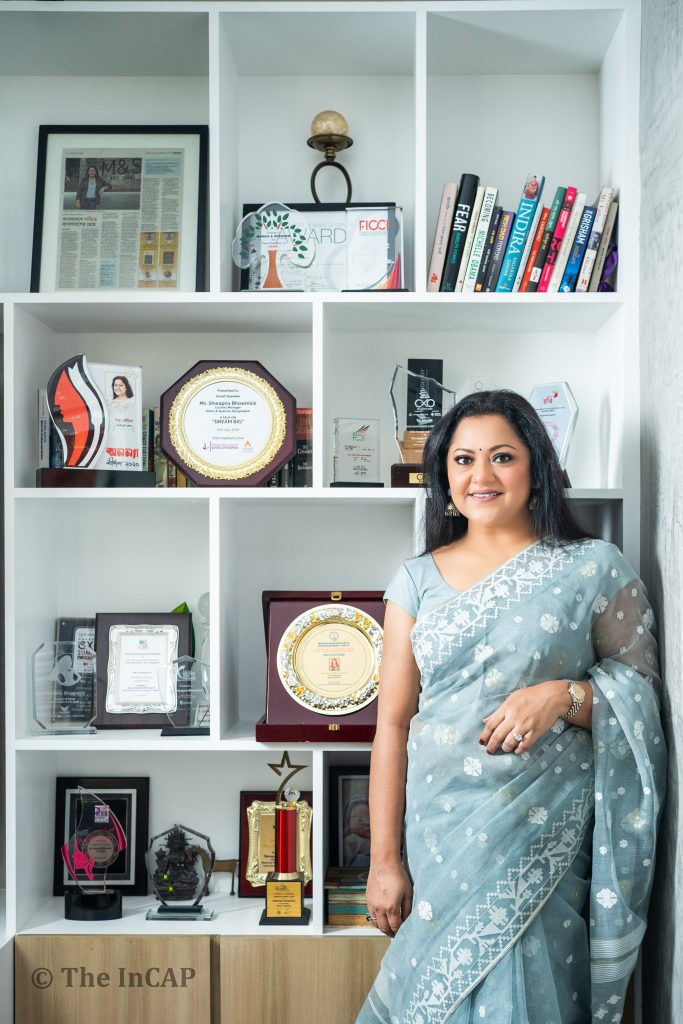
I am always searching to do things differently, following my instinct honed with years of varied experience. For example, I was not convinced that we would source just the core products for M&S; instead, I opted for high-value-added products to break out of the norm. We have been told many times that this or that product would not be viable in the market. However, we eventually developed those products and are producing them in the country. Of many, this chain of action depicts my will towards doing something different and bringing changes. To define my track career, I would say that I was a salesgirl who could sell products genuinely. Furthermore, I would say that I can build and sell with confidence stemming from the core of my belief.
Back in 2002, when I first entered the factory and saw no women at the executive level, it made me determined that I wanted to see myself in an executive-level position. After completing my graduation from the University of Dhaka, I joined the BUFT course. As a prerequisite for completing the course, I had to submit a report based on my visit to the garment factory. I went to Araf garment’s factory visit, and there was no female supervisor there, which triggered me immediately to be in that position as I was always hungry to bring change.
We are attentive to know an overview of M&S, such as the product and services you offer, your operation, team size, business model, size of business, and others you want to mention?
In 2005, Marks & Spencer started its journey in Bangladesh, and at that time, I was working at Walmart, where I was thriving. Since I am not complacent and am fond of taking risks, I have always embraced challenges and changes. While working at Walmart, I got an interview call from M&S. On the way to my interview, I was quite puzzled why they had called me. However, my interest in working for a big brand led me to present at that interview. Needless to say that M&S is one of the biggest British brands across the globe surviving World War I & II.
I had an excellent interview and intentionally asked for a very competitive salary package. Hearing my demand, the interviewer said, “Aren’t you asking too much of a salary?” In reply, I said, “I am here with a great vision, and since M&S was not known in Bangladesh, I would like to take the challenge to establish this brand. I still remember that I just went downstairs and got a call from HR. And I got the job on the same day.
With the vision of establishing M&S in Bangladesh, we started the production with jeans, only collaborating with one or two factories. At present, almost 55 percent of the goods sourced for the company go from Bangladesh. M&S, as a brand, is one of the most diversified brands that take nearly all types of clothing from Bangladesh. For instance, we have developed the ladies’ clothing business, which was sourced from China or Cambodia.
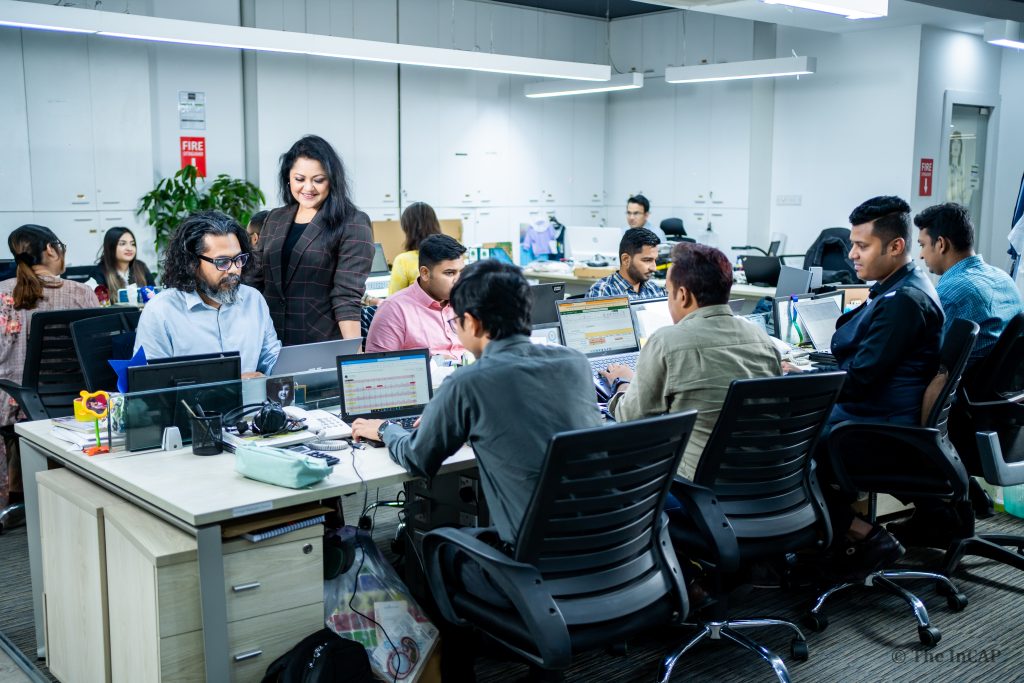
We first develop our product by providing a tech pack to the suppliers for specific designs to talk about our process. Then, I wanted to co-create products where the supplier will be able to input their ideas alongside us. In addition, we would also take the production-friendly factors into account from the beginning, and we were able to include more value-added products into our product line.
The process includes capacity booking with the suppliers, co-creating the product, and delivering through collaboration. Our engagement remains throughout the process where quality control, quality assurance, and factory compliance are also being examined. Usually, we work in a 360-degree way to cover every tiny aspect that correlates with product development to delivery.
Operating for more than 115 years, M&S has the openness to its employees, and from that, I was privileged to sit with the most talented people in the company and co-create product design. Rather than building a buyer-supplier relationship, we focused on a long-term partnership to develop skills, products, and the overall community. Putting everything-from product development to co-creation to delivery- in place, we have now flourished as a reliable brand.
In the very beginning, there were some challenges that I had to face to see the ray of success in my life. To describe my personal challenge, I would say that the garment industry is male-dominated, where female executives were extensively underestimated. If I had to share one of my experiences, I would say that in my initial days, no one paid any heed to my suggestion, let alone any order. Several meetings took place where I was the only female, and no one was listening to me. At some point, I used to raise my voice or stand up and talk to gain their attention. In this case, visibility was a phenomenal challenge that I had to face every day.
On another note, I love what I am doing right now. The whole garment industry always excites me, and from that excitement, I always had that energy and spirit, which eventually got me accepted and my voice heard. I am a person who doesn’t give up. To me, failure is not an option because there will be a possibility of failure whether I work with one or many products, as the outcome can be either positive or negative. I believe failure is like a reminder that gives one foresight to develop an action. Failure means trying a different direction, as failing is not an option.
We heard that you, with only five people, were responsible for working for the M&S at the beginning. What are the challenges that you faced, and how did you overcome those at that time?
Of course, it was difficult for us since we had limited resources intending to establish this brand in the country. However, our devotion drove us this far. For instance, we used to collect samples from Bongobazar and recreate those in British size to present to our buyers. At that time, our individual workload was equivalent to three to four persons’. Although we were a team of five to six people, the bonding and rhythm were unbreakable. In addition, our penchant for establishing true partnerships also helped us to a great extent. We used to work with those suppliers who shared the same values, principles, and devotion like us because this is where we came to a common ground. Having the right partners with us helped us to grow this far.
While everyone is always interested and sees success, all the sacrifices, efforts, and hard work is overlooked.
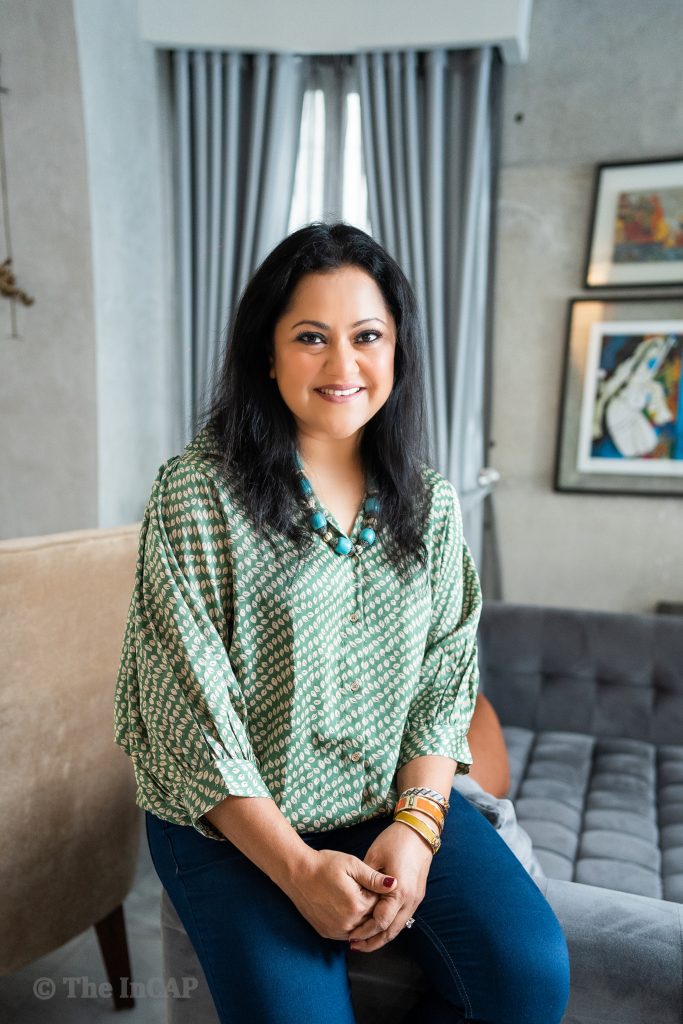
You represent the British Retail Industry in Bangladesh. How do you see the competition in the market?
No doubt that global competition is always there. We are navigating through the post-pandemic world, we have no cotton production, and China-America political relationship has a significant impact on the business. In the global competition where Vietnam, Cambodia, and India, to some extent, are there, I am negotiating as a global negotiator to bring business to Bangladesh. Meanwhile, we need to keep the quality intact, offer competitive pricing, and offer perfect design. While this global competition has challenges, it also provides several advantages. For instance, M&S operates the highest number of green factoring globally compared to the other countries.
As many of our investors are investing in green finance and green production, we can now showcase our products without damaging the environment. In addition, our country’s labor force is very resilient, which helped us grow the business significantly. Besides, the accidental incidents are one of the reasons why many didn’t want to invest in us, as those incidents created a negative impression of our RMG industry globally. Describing my strategy to get out of such a finger-pointing situation, I used to highlight our strengths and kept pushing to promote the RMG industry in Bangladesh.
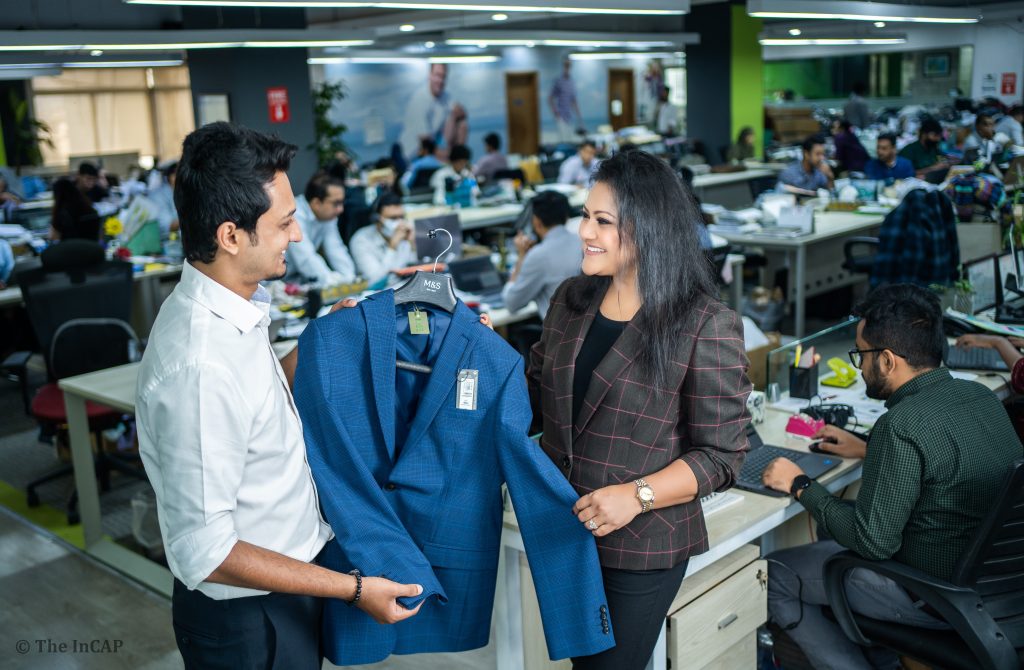
What’s your turning point concerning your career?
Although I am not sure which action I should refer to as a turning point, leaving a set job for a new one that needed to be established can be considered as the turning point. Being a risk-taker and fond of never settling, I would say that joining M&S can be viewed as the turning point. If I didn’t take that risk, I would never be a CO now.
During the pandemic, I used to come to the office every day except for the time when a lockdown was imposed throughout the nation. At that time, I looked for a suitable set of products that could keep the cash flow running so that I could offer salaries to the workers. For instance, I found that most people wear T-shirts and Joggers during the pandemic as everyone is working from home. So we boosted our production by almost 20% compared to the pre-pandemic production quantity. Hence, it is evident that you have to take the risk with a proper strategy to grow your business.
Another example of taking risks is we took all the workers from the Formal clothing production side and reskilled them with Gown production and made Gowns through them. Rather than hiding, we turned each challenge into an opportunity to grow.
As a country head, you must be aware of geopolitical matters. So what’s your take on it based on the current phenomenon?
We are focused on American and Europe markets, and its geopolitical matter has always impacted the business. However, we are looking forward to attracting the ASEAN countries so that we can avoid any geopolitical issues on that side. We are also working on extending our business; hence, it will not affect the business that much.
M&S is always looking for ways to contribute to the communities. How are they doing it?
Along with the vision to produce more value-added products and develop more skilled resources, M&S has also been working to bring impact to the community. Since our business kicked off, we started working on ensuring a cent percent digital payment system for our workers. Also, we wanted to introduce a system where female workers can get to keep their share even if their husbands or father tries to take their salaries from them. To date, we have ensured a 90% digital payment system in the company.
As per the data of 2007, 10% of the total population are disabled we wanted to work with them. Therefore, M&S incepted a program named “Marks & Star” to employ the physically challenged employees in companies by providing them with proper training and knowledge. Presently, around 4000 physically challenged people are working in our factories. In addition, we have worked on the workers’ safety and wellbeing of the female employees from the beginning. In our factory, we promote equality and women empowerment from where women can escalate and hold the leadership position in the company. Currently, around 200 women leaders are working in our factories; we are always working towards empowering them.
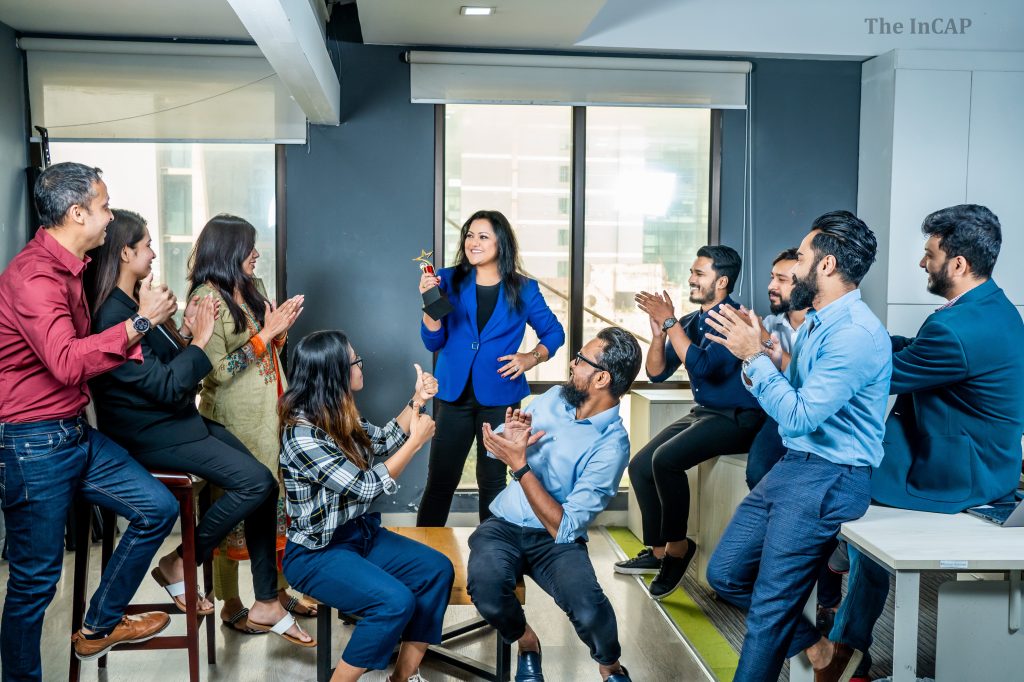
You have become the VP of FICCI. You are the first executive body leader from the garment industry. Please tell us the journey behind it?
The Foreign Investors’ Chamber of Commerce & Industry (FICCI) is one of the oldest chambers in the country, and they are responsible for helping to formulate many policies to facilitate the country’s economy. The primary reason for becoming the VP of this body is to learn, grow and leverage the network; this body is undoubtedly the knowledge tank with a tremendous capacity to contribute to the country’s development.
Why doesn’t Bangladesh see females at the upper executive level in Bangladesh? What do you think of the reasons?
I agree with you. There is hardly a female at the managerial level in the garment industry. I believe some predominant factors obstruct females from successfully flourishing. Those factors can be a mindset, condescending environment, and many others. But also the most important factor is whether a female employee is ready or not to take on such responsibilities as they have so many strings attached from parents to husband to children to various other social expectations. Hence, female employees get stuck in middle management before getting such a position. In addition, I believe that there should be flexibility for the female employees in the workplace as they have to wear many hats simultaneously. Therefore, companies see the output rather than the hours she had been sitting on the chair. If this practice is followed, I believe that female leadership will grow.
I strongly support the notion that female should sit in the driving seat because she is the driver of her life and career. So, don’t let others make your decision on behalf of you.
Bangladesh has eventually turned into the largest suits sourcing destination for M&S as the local suppliers have diversified the garment products and started making high-end items. What’s your comment on it?
Over the years, we have seen a lot of effort and investment coming in from our forward-thinking entrepreneurs to upskill our huge labor force, invest in state-of-the-art machineries, green factories, and develop technical know-how. This has greatly contributed to allowing us to move up the value chain to be a formidable producer of high-value products. However, we need to concentrate on digitization to move to the next frontier. There will be a digital transformation, and if we cannot cope with it now and if the girls don’t contribute, we will fall behind. Preparing the female workers with technical knowledge would be the best bet for us to make this industry future-proof. Bringing ease of doing business through port facilitation is another factor that would create more diversification in the industry and enhance the quality of our products.
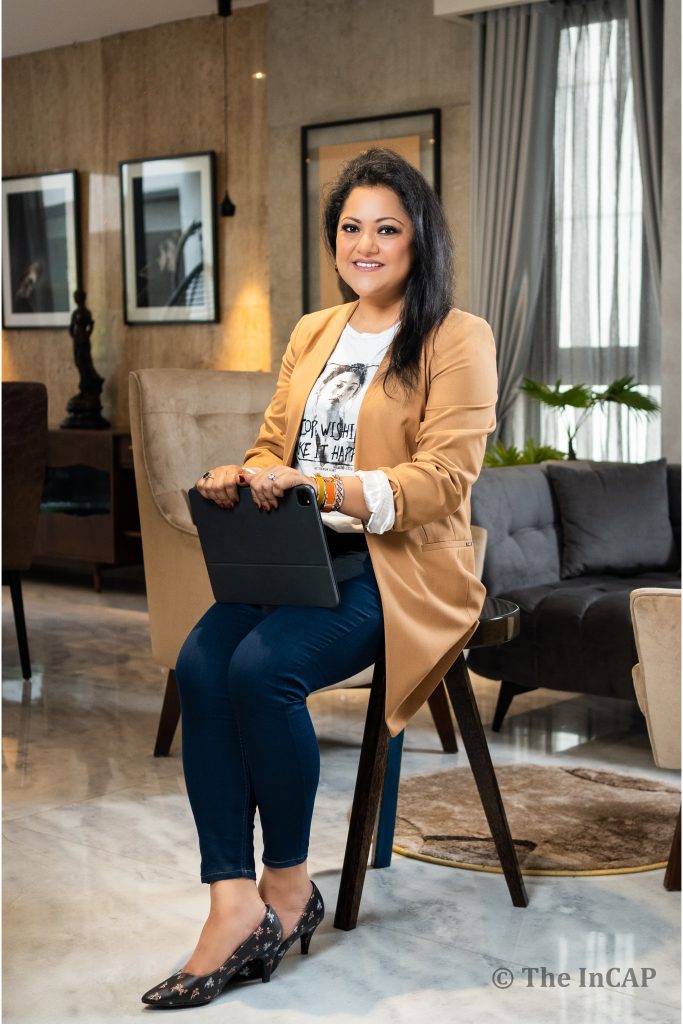
You are engaged in one of the most renowned brands across the globe. Of late, we published our latest issue covering the most phenomenal matter- Job Satisfaction. That said, we would like to hear how much you and the people around you enjoy their job?
Truly job satisfaction matters! I nurture a very cozy and fun culture that welcomes an intern, management trainees, to the upper executives of the organization with equal enthusiasm. In our organization, every individual is given an equal opportunity, voice, and an open space to grow compared to the other garment industry organizations. Employee-friendly office culture can motivate employees to strive to deliver the best regardless of the situation. The ‘Made in Bangladesh’ tag on each product makes us proud, and it indeed comes with many responsibilities.
Becoming the biggest sourcing country for M&S globally from zero didn’t just come from pushes; instead, it is the outcome of the constant hard work and a great work culture where employees love to work. The fact that around 4000 disabled workers and female leaders are working in the M&S sourcing factories is another example of our inclusiveness.
You are one of the most inspiring women in Bangladesh. Thousands of hearts follow you. What advice would you give to the women who are facing obstacles and biases to enter into the career?
It is your life, nobody else’s. You have the right to choose what you want to do in life. Although we were habituated to getting negative feedback from our parents, this practice among the parents should be discouraged in the family. I would suggest that parents should encourage their daughters alongside their sons. Parents usually want their children to become established and stay by their side. While you are thinking of keeping your son by their parent’s side, the same should apply to their daughters.
And to all the girls, I would say that change is inevitable, but it won’t happen overnight. Hence, it won’t do any good if you think you will come out of the confined environment once the situation changes. You are the change! I wanted to see the changes in the industry; hence, I became the change-maker in the industry. So if you are going through a break from work, you should also plan on going back.
From my point of view, I always push my limits to maximize my potential, and I assume that I am my own competitor who is always looking for ways to achieve excellence. So my advice is to prepare yourself, be a learner, and always strive for excellence every day.
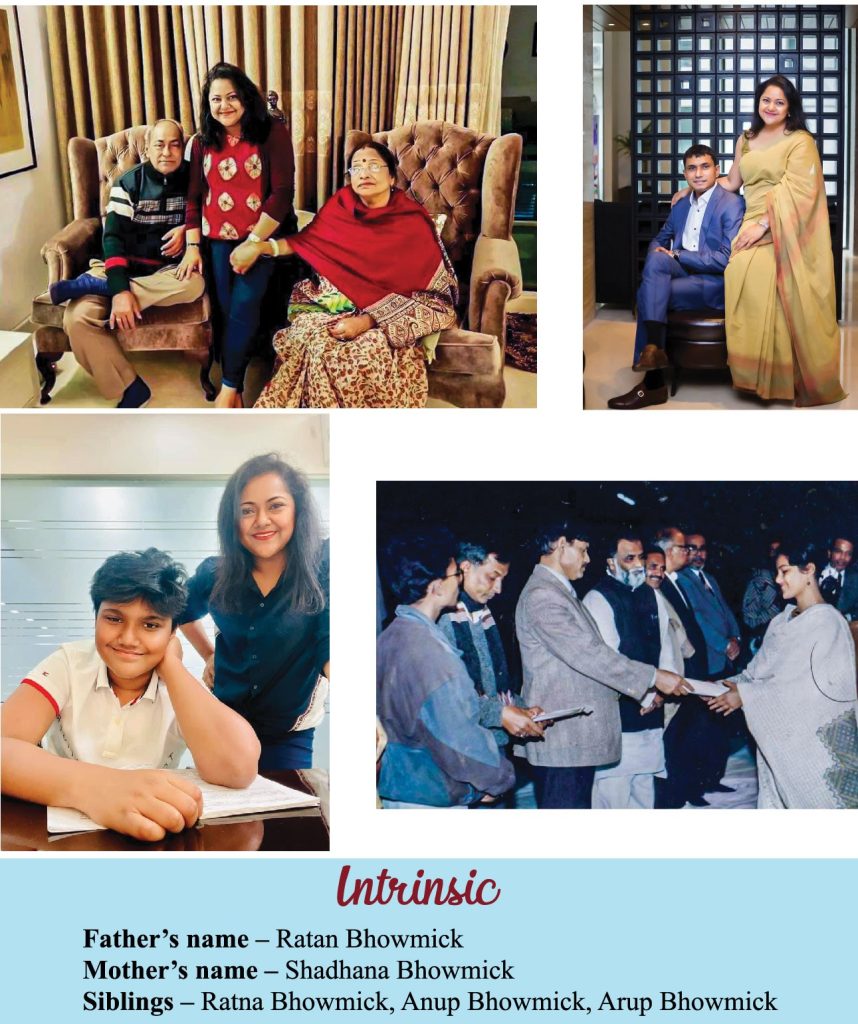
Self Portrait
Ms. Shwapna, how have your academic and professional life enlightened you?
I feel proud that my both academic and career are in Bangladesh. So, I can proudly say that I am a made in Bangladesh person. My school and college were Bogra Police Line School, Government Azizul Haque College, and then Dhaka University. Apart from these, I have been trained in different places like London, India, Sri Lanka, and Hong Kong. I have huge respect for the teachers. I believe teachers contribute to the growth of a person. I am lucky that I had great teachers in my life. They are one of the reasons for who I am today. So, I am always grateful to them.
In addition, for a successful career, you got to have mentors in your life. I was lucky to have great mentors who advised, guided, and supported me in my life. I absorb characteristics from everywhere, like a sponge, even from the juniors. I reach out to people for help and advice. However, I still have got a long way to go. But so far, what I have achieved till now, everything comes from how I have learned from everybody. I am lucky that I could establish that culture in the office, where they can reach out to everybody to learn and share.
What are your plans for the local people of your home district?
I am trying to create job opportunities. My father does social work in my home district on my behalf. He looks after the local people at Magura regarding their health issues, child care, maternity issues, etc. Till now, my total concentration is on my garment workers. I still could not do anything significant for my locals. However, I still have plans for doing something good for the wellbeing of people. Many people aren’t keen on any polytechnic and vocational training, teachers don’t get trained, and students are not excited to learn. Everyone is running after the white-collar job. Even there is an inadequate number of vocational training centers. As a result, the unemployment rate increases. So, I want to develop this sector in the future by getting more people to be interested in being properly trained and get engaged with this sector.
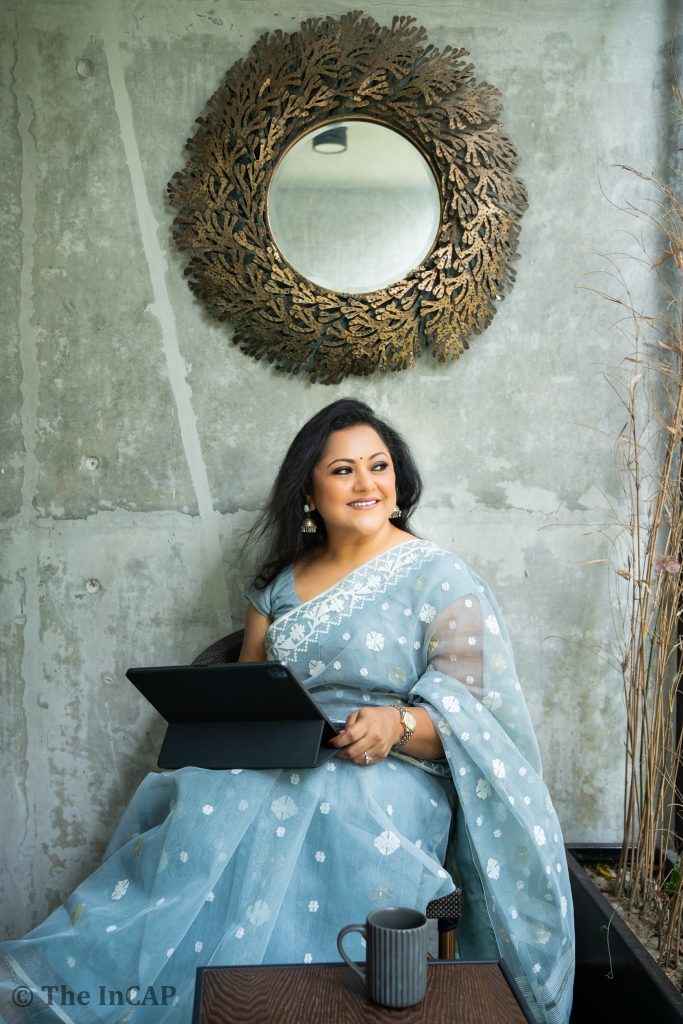
Do you have any plans for women in Bangladesh?
My nature is to learn and share with others. So, I try to do it, especially for women through FICCI, BBG platform, etc. I work in a Garment Industry, where a maximum number of workers are women. So, I’m trying to develop women’s empowerment and their wellbeing and will continue to do that at any cost. My priority is the garment workers. Specifically, I want them to be aware of their financial sides, have good financial knowledge, and be aware of their health and wellbeing so that they can take care of their own health. Also, I want to ensure their rights by making them brave to raise their voice constructively. Creating an environment like this is my ultimate plan.
What factors have influenced you and helped you become the person you are today?
My country influenced me a lot. I always think of the betterment of my country because Branding Bangladesh has always been my biggest motivation. I kept my eyes on the big picture. We, generally, people run after getting a promotion. But I never chase after designation. I have always concentrated on what and how I deliver my work in the best possible way, exceeding expectations. And these things have started chasing me! If I do something good, my country will be benefitted. That is my biggest inspiration, I think.
What is your life philosophy?
“For believe me! — the secret for harvesting from existence the greatest fruitfulness and the greatest enjoyment is: to live dangerously! Build your cities on the slopes of Vesuvius! Send your ships into uncharted seas! Live at war with your peers and yourselves! Be robbers and conquerors as long as you cannot be rulers and possessors, you seekers of knowledge! Soon the age will be past when you could be content to live hidden in forests like shy deer! At long last, the search for knowledge will reach out for its due: — it will want to rule and possess, and you with it!” – That is not my words, in fact, Friedrich Nietzsche. And that’s the philosophy of my life too.
We’re near the end of our glittering conversation. What’s your plan for Bangladesh?
Overall, I want to change the country’s image through meaningful work. Therefore, I will always be dedicated to Branding Bangladesh.
The InCAP: It was such a pleasure talking to you. Thanks for making the time. Your interview will be instructive and inspiring for people. Thank you, Shwapna Bhowmick!
Shwapna Bhowmick: Such a pleasure for me. Thank you very much to all of you. All the best wishes for InCAP and The InCAP.
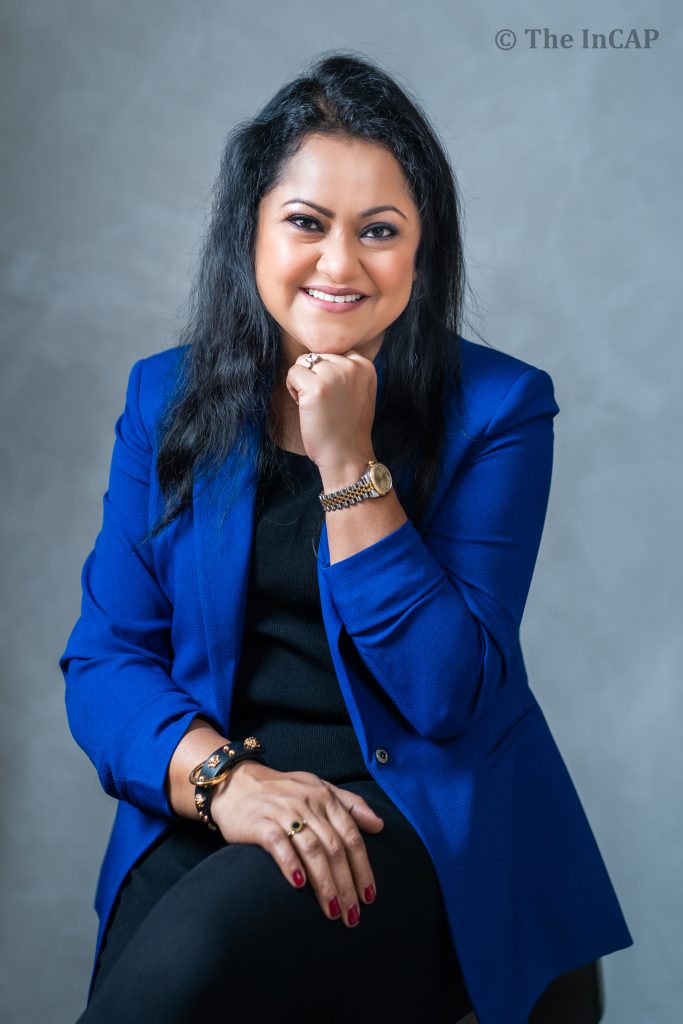
Quick Chat
The greatest achievement of your life as of now
Making Bangladesh the biggest sourcing country for M&S.
How do you define patriotism?
Doing the right thing, even when nobody is watching you.
The greatest philosopher, in your view
Friedrich Nietzsche
Meaning of “Success” to you
Seeing success in your eyes rather than somebody else’s eyes.
Your Icon
I really can’t say one person because there are many.
Name the most influential books you have read.
Shonchoyita, Rich Dad Poor Dad, Sapiens: A Brief History of Humankind, The Alchemist
What did you want to be when you were a child?
I always wanted to be the best version of myself.
Which is the best gift you’ve ever received?
Having a wonderful family
Your greatest fear
I think I am fearless
Favorite Poet and Author
Rabindranath Tagore
What motivates you?
Doing good for people
Hobby
Traveling
Your favorite holiday destination
Europe
Best piece of advice you’ve received
Be sponge & learn as much as you can
You, in only three words
Passionate, Enthusiastic, Perceptive as far as I recall
To explore more interviews with prominent persons, Please Click Here!



